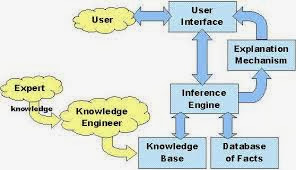Expert System, its Components And Others
Expert System Definition:
An expert system is a computer program that simulates the judgement and behavior of a human or an organization that has expert knowledge and experience in a particular field. Typically, such a system contains a knowledge base containing accumulated experience and a set of rules for applying the knowledge base to each particular situation that is described to the program. Sophisticated expert systems can be enhanced with additions to the knowledge base or to the set of rules.
Major Component of Expert System:
There is a answer of that question Component of Expert System?...i.e...There are some major components of Expert system that are:
Expert System--The User Interface:
The user interface is the means of communication between a user and the expert systems problem-solving processes. A good expert system is not very useful unless it has an effective interface. It has to be able to accept the queries or instructions in a form that the user enters and translate them into working instructions for the rest of the system. It also has to be able to translate the answers, produced by the system, into a form that the user can understand.Careful attention should be given to the screen design in order to make the expert system appear ‘friendly’ to the user.
Expert System--The Knowledge Base:
The knowledge base stores all the facts and rules about a particular problem domain. It makes these available to the inference engine in a form that it can use. The facts may be in the form of background information built into the system or facts that are input by the user during a consultation. The rules include both the production rules that apply to the domain of the expert system and the heuristics or rules-of-thumb that are provided by the domain expert in order to make the system find solutions more efficiently by taking short cuts.
Expert System--The Shell or Inference Engine:
The inference engine is the program that locates the appropriate knowledge in the knowledge base, and infers new knowledge by applying logical processing and problem-solving strategies.
Types of Expert System
There are many different types of expert systems. The following list describes the various types.
Diagnosis Expert System:
Diagnosis types of expert systems are used to recommend remedies to illnesses, trouble-shoot electronic or mechanical problems or as debugging tools.
Repair Expert System:
Expert systems that define repair strategies are also very common. As well as diagnosing the problem they can suggest a plan for the repair of the item. The repair plan typically contains a scheduling structure and some control structure to validate the repair process. Such systems have been employed in the automotive repair field and similar areas.
Instruction Expert System:
Instructional expert systems have been used for individualised training or instruction in a particular field. The system presents material in an order determined by its evaluation of the user’s ability and current knowledge and monitor’s the progress of the student, altering the sequence depending on this progress.
Interpretation Expert System:
Interpretive expert systems have the ability to analyse data to determine its significance or usefulness. The knowledge base often contains models of real world situations which it compares to its data. These are often used in exploration for mineral, gas and oil deposits as well as in surveillance, image analysis and speech understanding.
Prediction Expert System:
Predictive expert systems are used as a method to “guess” at the possible outcomes of observed situations, usually providing a probability factor. This is used often in weather forecasting.
Design and Planning Expert System:
This allows experts to quickly develop solutions that save time. These systems do not replace experts but act as a tool by performing tasks such as costing, building design, material ordering and magazine design.
Monitoring and Control Expert System:
In certain applications expert systems can be designed to monitor operations and control certain functions. These are particularly useful where speed of decision making is vitally important, for example in the nuclear energy industry, air traffic control and the stock market.
Classification/Identification Expert System:
These systems help to classify the goals in the system by the identification of various features (these can by physical or nonphysical) For example various types of animals are classified according to attributes such as habitat, feeding information, colour, breeding information, relative size etc. These systems can be used by bird watchers, fishing enthusiasts, animal rescue shelters (to match animals to prospective owners) to name a few.








0 comments:
Post a Comment